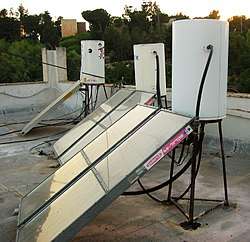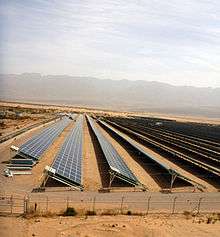Energy in Israel
Most energy in Israel comes from hydrocarbon fuels. The country's total primary energy demand is significantly higher than its total primary energy production, relying heavily on imports to meet its energy needs. Total primary energy consumption was 285.5 TWh (0.974 quad) in 2011, or 24.5 Mtoe (million tonne of oil equivalent).[1]
Electricity consumption in Israel was 59.83 TWh in 2014, while production was 64.44 TWh, with net exports of 4.94 TWh.[2] The installed generating capacity was about 16.25 GW in the same year, almost all from hydrocarbon fuel plants, mostly coal and gas fueled.[2] Renewable energy accounted for a minor share of electricity production, with a small photovoltaic installed capacity. However, there are a total of over 1.3 million solar water heaters installed as a result of mandatory solar water heating regulations.
History
Throughout Israel's history, securing the energy supply had been a major concern of Israeli policymakers.[3] Today, Israel Electric Corporation, which traces its history to 1923, is the main electricity generator and distributor in Israel.[4] Petroleum exploration began in 1947 on a surface feature in the Heletz area in the southern coastal plain. The first discovery, Heletz-I, was completed in 1955, followed by the discovery and development of a few small wells in Kokhav, Brur, Ashdod and Zuk Tamrur in 1957.[5] The combined Heletz-Brur-Kokhav field produced a total of 17.2 million barrels, a negligible amount compared with national consumption. Since the early 1950s, 480 oil and gas wells, land and offshore were drilled in Israel, most of which did not result in commercial success. In 1958–1961, several small gas fields were discovered in the southern Judean desert. From the Six-Day War until the Egyptian Separation Treaty in 1975, Israel produced large quantities of petroleum from the Abu Rodes oil field in Sinai.[6]
In 1951, the Arab states accused American oil interests in Saudi Arabia of selling oil to Central American governments who circumvented the Arab blockade against Israel by selling the oil back to the refinery in Haifa.[7]
Primary energy
Natural gas
.jpg)
Since Israel’s creation in 1948, it has been dependent on energy imports from other countries.[8] Specifically, Israel produced 7 billion cubic meters of natural gas in 2013, and imported 720 million cubic meters in 2011.[9] Historically, Israel has imported natural gas through the Arish-Ashkelon pipeline from Egypt.[10] Egypt is the second-largest natural gas producer in North Africa. In 2005 Egypt signed a 2.5 billion-dollar deal to supply Israel with 57 billion cubic feet of gas per year for fifteen years.[11] Under this arrangement, Egypt supplies 40 percent of Israel's natural gas demand.[11] The Israeli Electric Corporation (IEC) controls more than 95% of the electricity sector in Israel, and controls production, distribution, and transmission of electricity. The IEC has a natural gas distribution law which regulates the distribution of natural gas in Israel to empower market competition.[12]
The discoveries of the Tamar gas field in 2009 and the Leviathan gas field in 2010 off the coast of Israel were important. The natural gas reserves in these two fields (Leviathan has around 19 trillion cubic feet)[10] could make Israel energy secure for more than 50 years. In 2013 Israel began commercial production of natural gas from the Tamar field.
Energy Minister Yuval Steinitz said “For many decades, the Arabs used the fact that they’re supplying Europe with oil and natural gas in order to try to pressure Israel...And now we will have something to balance and influence.”[13]
Electricity
In 2015, energy consumption in Israel was 52.86 TWh,[14] or 6,562 kWh per capita.[15] The Israel Electric Corporation (IEC) is the main producer of electricity in Israel, with a production capacity of 11,900 megawatts.[16] In 2016, IEC's share of the electricity market was 71%.[17]
Hydrocarbon fuels
Most electricity in Israel comes from hydrocarbon fuels from the following IEC power plants:
| Name | Location | Type of turbine | Type of fuel | Capacity (MW) 2017 |
|---|---|---|---|---|
| Orot Rabin | Hadera | Steam | Coal | 2,590 |
| Orot Rabin | Hadera | Gas (jet) | Diesel | 15 |
| Rutenberg Power Station | Ashkelon | Steam | Coal | 2,250 |
| Rutenberg Power Station | Ashkelon | Gas (jet) | Diesel | 40 |
| Eshkol Power Station | Ashdod | Steam | Natural gas | 912 |
| Eshkol Power Station | Ashdod | Gas (jet), combined cycle | Natural gas | 771 |
| Eshkol Power Station | Ashdod | Gas (jet) | Diesel | 10 |
| Reading Power Station | Tel Aviv | Steam | Natural gas | 428 |
| Haifa Power Station | Haifa | Steam | Natural gas | 282 |
| Haifa Power Station | Haifa | Steam | Natural gas | 748 |
| Haifa Power Station | Haifa | Gas (jet) | Diesel | 80 |
| Eilat Power Station | Eilat | Gas (jet and industrial) | Diesel | 34 |
| Eitan Power Station | Gas (jet) | Diesel, methanol | 58 | |
| Alon Tavor Power Station | Alon Tavor Industrial Zone | Gas (industrial) | Diesel | 220 |
| Alon Tavor Power Station | Alon Tavor Industrial Zone | Combined cycle | Natural gas | 363 |
| Gezer Power Station | Ramla | Gas (industrial) | Natural gas | 592 |
| Gezer Power Station | Ramla | Combined cycle | Natural gas | 744 |
| Hartuv Power Station | Gas (jet) | Diesel | 40 | |
| Hagit Power Station | Elyakim | Combined cycle | Natural gas | 1,394 |
| Kinarot Power Station | Gas (jet) | Diesel | 80 | |
| Atarot Power Station | Gas (industrial) | Diesel | 68 | |
| Tzafit Power Station | Kiryat Mal'akhi | Gas (industrial), combined cycle | Natural gas, Diesel | 580 |
| Caesarea Power Station | Gas (jet) | Diesel | 130 | |
| Ramat Hovav Power Station | Ramat Hovav | Gas (industrial), combined cycle | Natural gas | 1,137 |
| Ra'anana Power Station | Ra'anana | Gas (jet) | Diesel | 11 |
The following power plants belong to independent power producers and, although connected to the IEC’s distribution grid, are not operated by the IEC:
| Name | Location | Type of turbine | Type of fuel | Capacity (MW) 2017 |
|---|---|---|---|---|
| Dorad Power Station | Ashkelon | Gas (jet), combined cycle | Natural gas | 840 |
| Dalya Power Station | Kfar Menahem | Combined cycle | Natural gas | 870 |
| OPC Rotem | Mishor Rotem | Combined cycle | Natural gas | 440 |
Renewable energy
Renewable energy in Israel is produced in solar fields, such as Energix Renewable Energies' Neot Hovav and Ketura Sun and from biogas (11 MW), hydroelectricity (6.6 MW) and wind power in the Golan Heights Wind Farm (6 MW).
Despite getting more than 300 days of sunshine per year, as of 2015, less than 2% of Israel‘s electricity comes from renewable sources. According to the Green Energy Association of Israel, the number of solar energy companies in the country has fallen from about 130 in 2010 to 60 in 2015. The Association says that discoveries of large amounts of natural gas since 2009 have dimmed the government's interest in renewable energy. Officially, however, Israel maintains it will achieve its goal of 10% of its energy from renewable sources by 2020.[18]
Nuclear energy
Although there is a fully functional heavy water nuclear reactor at Negev Nuclear Research Center, As of 2013 Israel has no nuclear power plants. However, in January 2007, Israeli Infrastructure Minister Binyamin Ben-Eliezer said his country should consider producing nuclear power for civilian purposes.[19]
As a result of the nuclear emergencies at Japan's Fukushima I Nuclear Power Plant, Prime Minister Benjamin Netanyahu said on March 17, 2011, "I don't think we're going to pursue civil nuclear energy in the coming years."[20][21][22]
Solar water heating

Israel is one of the world leaders in the use of solar thermal energy per capita.[23] As of the early 1990s, all new residential buildings were required by the government to install solar water-heating systems, and Israel's National Infrastructure Ministry estimates that solar panels for water-heating satisfy 4% of the country's total energy demand.[24] Israel and Cyprus are the per-capita leaders in the use of solar hot water systems with over 90% of homes using them.[25] The Ministry of National Infrastructures estimates solar water heating saves Israel 2 million barrels (320,000 m3) of oil a year.[26]
See also
References
- ↑ "Israel". EIA - US Energy Information Administration. Retrieved 16 August 2013.
- 1 2 "Israel". World Factbook. CIA - Central Intelligence Agency. Retrieved August 21, 2016.
- ↑ Sachs, Tim Boersma and Natan. "The energy island: Israel deals with its natural gas discoveries". Brookings.edu. Retrieved 6 December 2017.
- ↑ Shamir, Ronen (2013). Current Flow: The Electrification of Palestine. Stanford: Stanford University Press.
- ↑ "Israel's Energy Security: Regional Implications - Middle East Policy Council". www.MEPC.org. Retrieved 6 December 2017.
- ↑ "Petroleum and Natural Gas Prospecting". Energy.gov.il. Retrieved 6 December 2017.
- ↑ "Corpus Christi Times, August 4 1951". Retrieved 2018-07-01 – via NewspaperARCHIVE.
- ↑ Blanche, Ed. "Israeli Gas Finds Could Prove A Game Changer." Middle East 416 (2010): 22-25.
- ↑ The World Factbook 2013-14. Washington, DC: Central Intelligence Agency, 2013.
- 1 2 "Israel - Country Analysis Note." U.S. Energy Information Administration, March 2014.
- 1 2 Antreasyan, Anaïs. "Gas Finds in the Eastern Mediterranean" Journal of Palestine Studies, Vol. 42, No. 3 (Spring 2013), pp. 29–47
- ↑ Ben-Shalom, Jeremy. "Israel: National Report for CDS" - 14/15 Thematic Areas.
- ↑ "Energy Minister: Natural gas can transform Israel's geopolitical status". JPost.com. Retrieved 6 December 2017.
- ↑ International Energy Agency (2015). "Key World Energy Statistics" (PDF). p. 52. Retrieved August 21, 2016.
- ↑ International Energy Agency (2015). "Key World Energy Statistics" (PDF). p. 53. Retrieved August 21, 2016.
- ↑ Barkat, Amiram (July 18, 2012). "Electricity reserves dwindling precariously". Globes. Retrieved April 26, 2013.
- ↑ Gutman, Lior (August 20, 2016). "Private Power Stations Now Produce 29% of Israel's Electricity". Calcalist (in Hebrew). Retrieved August 21, 2016.
- ↑ "Israel's 300 Days of Sun No Help as Offshore Gas Eclipses Solar". Bloomberg Businessweek. 10 September 2015.
- ↑ "Israel Should Develop Nuclear Energy". Agence France-Presse. 2007-01-23. Retrieved 2007-07-14.
- ↑ Israel Prime Minister Netanyahu: Japan situation has "caused me to reconsider" nuclear power Piers Morgan on CNN, published 2011-03-17, accessed 2011-03-17
- ↑ Israeli PM cancels plan to build nuclear plant, Xinhuanet, published 2011-03-18, accessed 2011-03-17
- ↑ Netanyahu: We'll reconsider nuclear power plans Ynetnews, published 2011-03-18, accessed 2011-03-17
- ↑ The Samuel Neaman Institute for Advanced Studies in Science and Technology — Publications — Solar energy for the production of heat Summary and recommendations of the 4th assembly of the energy forum at SNI
- ↑ Sandler, Neal (26 March 2008). "At the Zenith of Solar Energy". Bloomberg Businessweek. Retrieved 12 August 2012.
- ↑ Del Chiaro, Bernadette; Telleen-Lawton, Timothy. "Solar Water Heating (How California Can Reduce Its Dependence on Natural Gas)" (PDF). Environment California Research and Policy Center. Retrieved 2007-09-29.
- ↑ Israeli Section of the International Solar Energy Society, edited by Gershon Grossman, Faculty of Mechanical Energy, Technion, Haifa; Final draft.
